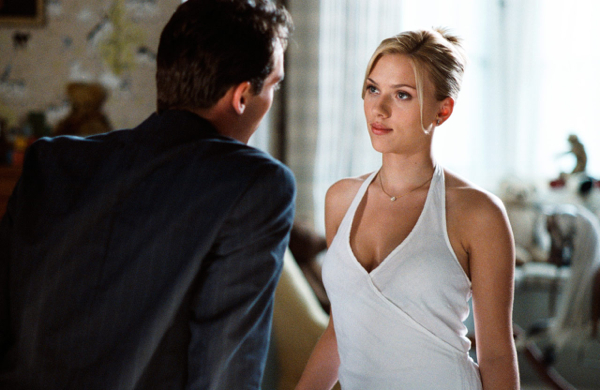Movie review by Greg Carlson
A robust melodrama that mixes its dark tale of upward mobility with a streak of black humor, Woody Allen’s “Match Point” is both attractive and involving. Recalling Allen’s “Crimes and Misdemeanors,” as well as the director’s long-standing thematic preoccupation with Ingmar Bergman, “Match Point” explores guilt, infidelity, morality, and the function of luck. Set in the London equivalent of Allen’s fairytale Manhattan, “Match Point” focuses on Chris Wilton (Jonathan Rhys-Meyers), a social climber who uses his job as a country club tennis pro to gain access to a fabulously wealthy family.
In the blink of an eye, Chris seduces Chloe Hewett (Emily Mortimer), the eager sister of his tennis student Tom (Matthew Goode). Invited one weekend to the Hewett’s opulent country house, Chris encounters Nola Rice (Scarlett Johansson), the dangerous and beguiling American fiancée of Tom. Unable to resist the allure of Nola, Chris chases her outside during a rainstorm and they have torrid sex, even though his future with the Hewett family is all but secured. Before things get out of hand, however, fate intervenes and Nola and Tom call it off. Nola disappears from Chris’ new life.
Nola’s absence from the scene is only temporary, and a chance encounter at the Tate Modern many months later – and following Chris’ wedding to Chloe – rekindles his lust. Like “An American Tragedy,” and its cinematic cousin “A Place in the Sun,” “Match Point” puts its central character in an impossible bind that can only yield devastating results. Allen relishes the opportunity to make his audience squirm, and a close-up of Chris’ reading material, “Crime and Punishment,” additionally alludes to a potentially horrific outcome. The more Nola pressures him to abandon his wife, the more Chris realizes he has grown far too accustomed to his elite lifestyle to want to leave it.
One looking for Allen’s customary approach to comedy won’t find much of it here, although “Match Point” isn’t as far off the Allen track as one might initially think. One of “Match Point’s” underlying themes, the desire of someone from the working class to get a ticket to untold riches, illuminates Allen’s longtime fascination with the good life. “Match Point” overflows with eye-popping material grandeur, from chauffer-piloted sedans to apartments with floor-to-ceiling views of Westminster Abbey. Even as Michael Atkinson calls Allen an “unapologetic wealth pornographer,” the director’s fascination with privilege seduces the audience right along with Chris, implicating the viewer when Chris begins to contemplate the unthinkable.
Continuing his knack for superb casting, Allen’s ensemble forms a perfect company. The director purposefully feeds his viewer very little background information regarding Chris or Nola, which has the direct effect of making us wonder exactly what each character is plotting to do. Johansson continues her run as one of cinema’s most desirable personalities, injecting Nola with a dazzling combination of pouty-lipped, doe-eyed sexuality and fragile, needy, insecurity. Rhys-Meyers is equally good as Chris, and Mortimer, Goode, Brian Cox, and Penelope Wilton all register memorably in their roles.
